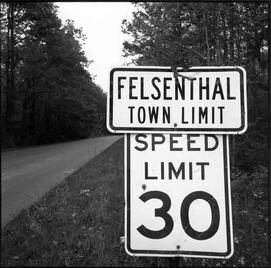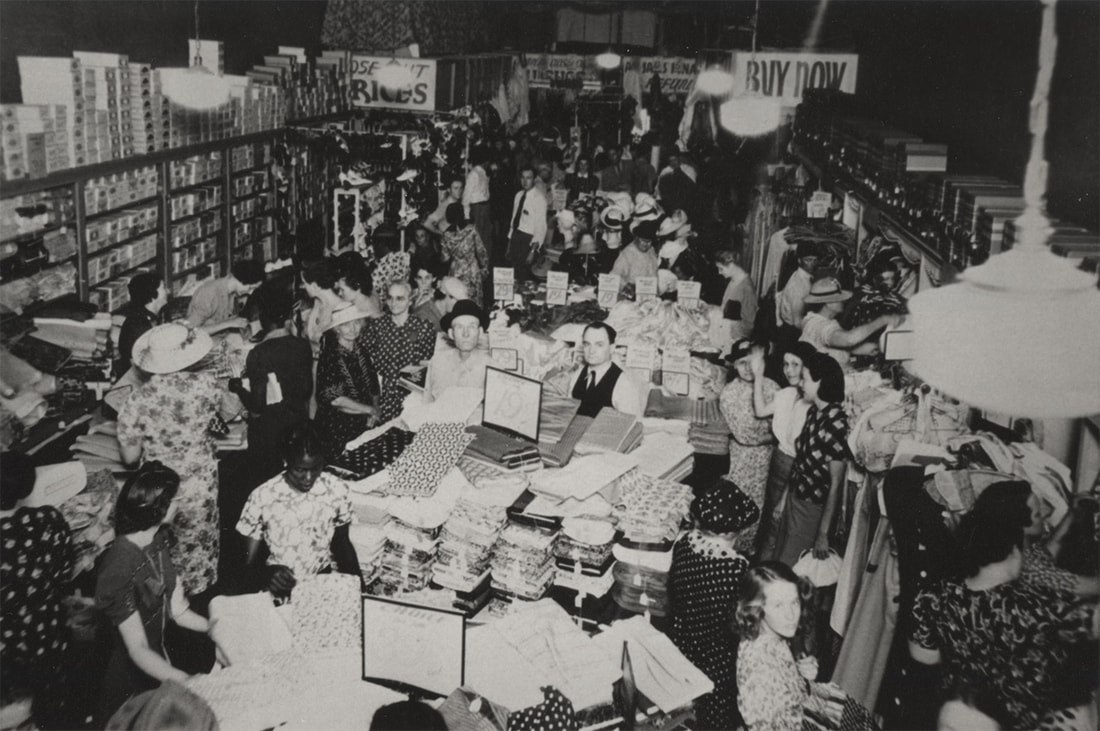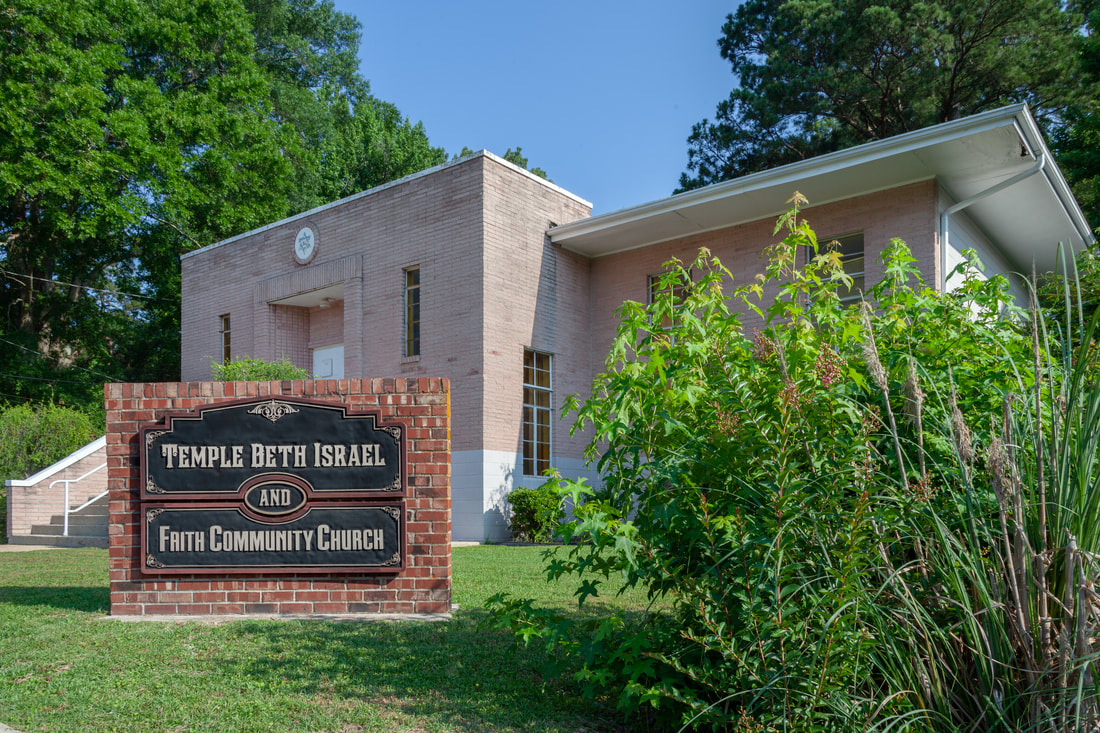Encyclopedia of Southern Jewish Communities - El Dorado, Arkansas
Overview
El Dorado, Arkansas, sits near the border of southern Arkansas and Louisiana and serves as the seat of Union County. The city traces its history to a dry goods store founded in 1843, and its Spanish derived name translates to “the Gilded Road.” As a small trading lumber and agricultural trading hub, El Dorado grew slowly until January 1921, when a storm of oil speculation brought a surge of economic activity and new residents. The town’s population grew from some 4,000 individuals in 1921 to almost 30,000 in 1925. The boom abated somewhat by 1930, however, and El Dorado’s population dropped to 16,000. While oil production recovered somewhat in the late 1930s, the town never regained the size or economic activity that transformed local life in the early to mid-1920s.
Although the city’s earliest Jewish family, the Felsenthals, were present in the early 1900s, the Jewish community in El Dorado did not grow notably until the 1921 oil boom, which brought an influx of Jewish entrepreneurs. Jewish organizational life began shortly thereafter with the formation of two congregations, although these merged and then dissolved. In the 1940s, El Dorado Jews established a new synagogue, and the town reached its peak Jewish population. By the 1980s, Jewish life in El Dorado had dwindled considerably, and a church had rented out the congregation’s space.
Although the city’s earliest Jewish family, the Felsenthals, were present in the early 1900s, the Jewish community in El Dorado did not grow notably until the 1921 oil boom, which brought an influx of Jewish entrepreneurs. Jewish organizational life began shortly thereafter with the formation of two congregations, although these merged and then dissolved. In the 1940s, El Dorado Jews established a new synagogue, and the town reached its peak Jewish population. By the 1980s, Jewish life in El Dorado had dwindled considerably, and a church had rented out the congregation’s space.
Stories of the Jewish Community in El Dorado
 Photo by Bill Aron, c. 1990.
Photo by Bill Aron, c. 1990.
El Dorado’s first Jewish settlers, the Felsenthal family, lived in Union County and ran a land and timber company throughout the early 1900s. In 1904, the Felsenthals incorporated the town of Felsenthal, which was unincorporated in 1911 due to economic decline and a series of damaging floods. Of the Felsenthal brothers—Adolph, Ike, Sidney, and Lee—Ike and Sidney also operated the Carson Dry Goods Company’s El Dorado branch store until 1921. When oil was discovered in El Dorado, Ike and Sidney promptly sold their dry goods store to enter the oil business. In addition to entering the oil business, the Felsenthals collaborated with two other El Dorado residents, Col. T.H. Borton and G.W. Jones, to establish the Exchange Realty Company in 1926. The Exchange Realty Company was responsible for constructing the Exchange Building, at the time El Dorado’s largest office structure. Ike Felsenthal played a crucial role in the establishment of El Dorado’s Chamber of Commerce, served as chairman of the farm bureau with the goal of improving farming conditions, introduced the velvet bean—a popular medicinal plant—to Union County, and spearheaded home demonstration work throughout the county. Sidney Felsenthal was also an active participant in many civic organizations, serving on the Salvation Army Board for 50 years.
Business and Civic Life
The 1920s oil boom not only caused the general population of El Dorado to quadruple in just a few years but also attracted several other Jewish residents who became locally prominent. At El Dorado’s 1925 peak, there were around 30 Jewish families, many of whom were engaged citizens, either as business owners, politicians, or active temple members. Sam Baum owned a jewelry store and was active in local civic organizations, and Ralph and Bluma Ginsburg managed the pipe department of the Arkansas Pipe and Supply Company.
The most notable local Jewish leader and business owner was New Orleans native Irving Leon “Izzy” Pesses, who settled in El Dorado in 1932. Pesses held an engineering degree from Tulane University and had previously designed and built bridges, but in El Dorado he pursued a variety of business ventures. Pesses founded steel fabrication company Arkansas steel, helped establish and served as president of the Pesses and Marks Pipe and Supply Company, served as vice-president of the El Dorado Paper Bag Company, and gained a reputation for business and civic leadership. In addition to his business ventures, Pesses was president of the El Dorado Kiwanis club, the Chamber of Commerce, and the city’s Industrial Development Corporation. He served on the Arkansas Crime Commision under Governor Winthrop Rockefeller and was on the executive board of the Arkansas Municipal League. Pesses ultimately served as mayor of El Dorado from 1967 until his death in 1976. As mayor, Pesses was responsible for straightening streets and building bridges.
The most notable local Jewish leader and business owner was New Orleans native Irving Leon “Izzy” Pesses, who settled in El Dorado in 1932. Pesses held an engineering degree from Tulane University and had previously designed and built bridges, but in El Dorado he pursued a variety of business ventures. Pesses founded steel fabrication company Arkansas steel, helped establish and served as president of the Pesses and Marks Pipe and Supply Company, served as vice-president of the El Dorado Paper Bag Company, and gained a reputation for business and civic leadership. In addition to his business ventures, Pesses was president of the El Dorado Kiwanis club, the Chamber of Commerce, and the city’s Industrial Development Corporation. He served on the Arkansas Crime Commision under Governor Winthrop Rockefeller and was on the executive board of the Arkansas Municipal League. Pesses ultimately served as mayor of El Dorado from 1967 until his death in 1976. As mayor, Pesses was responsible for straightening streets and building bridges.
Outside of corporate and government leadership, El Dorado boasted many Jewish small-business owners and branch store owners. The Berk family migrated to El Dorado in the 1920s, and both Ben Berk and his son Isadore owned jewelry stores and practiced optometry. Ben Berk established his jewelry business in the early 1920s, followed by Isadore soon after in 1925. Both stores operated as jewelry and optometry businesses. However, when a state law passed banning combined jewelry and optometry businesses, Isadore sold the jewelry operation to his brother, Joe, and continued as an optometrist. Joe Berk went on to establish a dry goods store in nearby Magnolia, which he operated until 1944. Morris Lewis, son of immigrants Abraham and Rachel Lewis, was invited to El Dorado by Hyman Packman, a previous Jewish settler. In 1932, Lewis opened the New York Store, a ladies’ ready-to-wear store, which he ran for the next 42 years.
Although many Jewish residents in El Dorado owned retail stores, Jews in the city also pursued a variety of other occupations. After the oil boom, H.J. Warshavsky moved to El Dorado with his daughters Sarah Steinberg and Jeanette Bernstein. Jeanette’s husband, Martin Bernstein, a WWI veteran, American Legion Commander, and president of the Lions club, was an avid musician and played violin with many groups in El Dorado. Bernstein initially made his living in retail, but in 1932 he sold his store in order to open the El Dorado Conservatory of Fine Arts with Jeanette. There, Martin ran the violin department and Jeanette ran the speech department as well as Junior Little Theatre. Eventually, Martin went on to practice law. In 1936, family responsibilities in Cheyenne, Wyoming, forced the Bernstein family to leave Arakansas.
El Dorado was also home to the first location of a popular chain of variety stores owned by Sam and David Grundfest. The brothers moved to Arkansas from Mississippi after Sam served in the U.S. military, and their Sterling Stores chain started with an El Dorado location. By 1932, the brothers had opened 70 stores across Arkansas and nearby states. Although the depression forced them to cut back to only 27 stores, by 1941 their company had over 60 stores as well as a wholesale house located in Little Rock.
Although many Jewish residents in El Dorado owned retail stores, Jews in the city also pursued a variety of other occupations. After the oil boom, H.J. Warshavsky moved to El Dorado with his daughters Sarah Steinberg and Jeanette Bernstein. Jeanette’s husband, Martin Bernstein, a WWI veteran, American Legion Commander, and president of the Lions club, was an avid musician and played violin with many groups in El Dorado. Bernstein initially made his living in retail, but in 1932 he sold his store in order to open the El Dorado Conservatory of Fine Arts with Jeanette. There, Martin ran the violin department and Jeanette ran the speech department as well as Junior Little Theatre. Eventually, Martin went on to practice law. In 1936, family responsibilities in Cheyenne, Wyoming, forced the Bernstein family to leave Arakansas.
El Dorado was also home to the first location of a popular chain of variety stores owned by Sam and David Grundfest. The brothers moved to Arkansas from Mississippi after Sam served in the U.S. military, and their Sterling Stores chain started with an El Dorado location. By 1932, the brothers had opened 70 stores across Arkansas and nearby states. Although the depression forced them to cut back to only 27 stores, by 1941 their company had over 60 stores as well as a wholesale house located in Little Rock.
Organized Jewish Life
Jewish institutions formed in El Dorado within a year or so of the initial oil boom. New Jewish residents helped to establish a a B’nai B’rith Lodge in 1922, and two congregations formed soon after, one Reform and one Orthodox. However, by the end of the decade, the two groups merged into one congregation, which took the name Ohev Zedek (Love of Justice). J. Benjamin Miller, a store owner and later insurance agent who moved to El Dorado in 1925, was well-taught in Hebrew and Orthodox Judaism, and led congregational life at Ohev Zedek. In 1927 an estimated 124 Jews lived in El Dorado.
Following the oil boom’s 1925 peak, El Dorado contracted as recent arrivals left. Economic opportunities in the city proved fleeting, first due to overdrilling and the collapse of the speculative bubble and then because of the Great Depression. As a result, the Jewish community declined. From the mid-1920s to 1936 the local Jewish population shrunk by half, and the congregation closed. The remaining Jewish residents met with the small Jewish community of Camden with another small group of Jewish citizens who lived in Camden, roughly 30 miles north. In 1937 another significant oil discovery occurred in El Dorado, however, which gave the former boomtown a second wind. With the support of the Arkansas Jewish Assembly, El Dorado Jews established a new Reform congregation, Beth Israel, in the 1940s. Irving Leon Pesses helped found the new congregation and served as its president.
Following the oil boom’s 1925 peak, El Dorado contracted as recent arrivals left. Economic opportunities in the city proved fleeting, first due to overdrilling and the collapse of the speculative bubble and then because of the Great Depression. As a result, the Jewish community declined. From the mid-1920s to 1936 the local Jewish population shrunk by half, and the congregation closed. The remaining Jewish residents met with the small Jewish community of Camden with another small group of Jewish citizens who lived in Camden, roughly 30 miles north. In 1937 another significant oil discovery occurred in El Dorado, however, which gave the former boomtown a second wind. With the support of the Arkansas Jewish Assembly, El Dorado Jews established a new Reform congregation, Beth Israel, in the 1940s. Irving Leon Pesses helped found the new congregation and served as its president.
After World War II, El Dorado was home to around 30 Jewish families, who met regularly with lay leader Miller in a rented headquarters located on North Washington Street. In 1955, Pesses’ construction company finished construction for a permanent synagogue building. On the high holidays, a Hebrew Union College Rabbinical Student would serve the community, and Rabbi Joseph Levine of Texarkana came monthly throughout the 1960s and 1970s. Rabbi Levine offered Jewish education, as well as Friday night services, discussion group dinners on Saturdays, and Sunday morning religious school assistance.
The Jewish Community in El Dorado Today
In the late 1960s, the second decline of El Dorado’s oil industry led to economic stagnation, and the city began to lose population by 1990. Unsurprisingly, these general trends negatively affected the Jewish community. By the 1980s only half a dozen Jewish families remained in El Dorado. With the Jewish community severely diminished, maintaining the synagogue building proved challenging, and a Christian group rented the synagogue on a part-time basis. Eventually, only the religious school persisted, led by Janet Stuart. Her husband, Joseph Stuart, was also an active member of Temple Beth Israel and frequently spoke about Judaism at local Christian churches in order to inform non-Jews about the Jewish community and combat antisemitism.
As of 2023, a Christian congregation occupies the former Beth Israel synagogue. However, the church pays homage to the building’s roots with a sign that reads “Temple Beth Israel and Faith Community Church.” Although few Jews remain in El Dorado as of 2023, the city’s history includes a number of significant Jewish business people and civic leaders.
As of 2023, a Christian congregation occupies the former Beth Israel synagogue. However, the church pays homage to the building’s roots with a sign that reads “Temple Beth Israel and Faith Community Church.” Although few Jews remain in El Dorado as of 2023, the city’s history includes a number of significant Jewish business people and civic leaders.
Updated March 2024.


